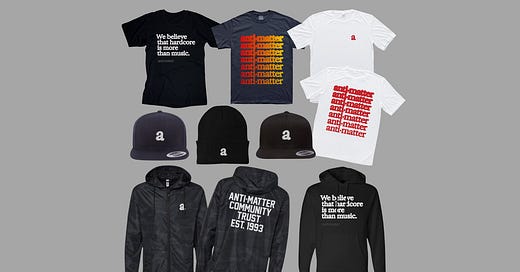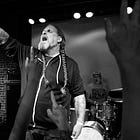The Best of Anti-Matter
The archives are free and open until 2025. Preorders for the final merch drop are winding down shortly. It's the holiday season, so let's put a bow on it.
Before we turn the lights off for a while around these parts, there are still two matters of unfinished business that I wanted to draw your attention towards. For one thing, presale orders for the last minute/last chance Anti-Matter merch drop are coming to a close on December 23. All items are being made to order and will begin shipping shortly after Christmas.
I really wasn’t planning on doing any more merch, but I received an overwhelming amount of requests from readers who wanted to show their support for the project in this way, one last time, and it felt like a good opportunity to be selfish and make a couple of things that I personally want to wear in the world. (If you know me, then you know I love a good windbreaker and snapback hat!) It would also make me extremely happy to see more people out in the world wearing a shirt that reads: “We believe that hardcore is more than music.” I hope you can be one of them, but either way, this is the last run.
In addition to that, I wanted to direct your attention to the fact that I have opened the entirety of the Anti-Matter archives to the public—for free, for now. That’s over 120 essays and interviews in all. The archives will remain open until some point in January 2025, when I’ll start making a few more decisions about the future of this project. Until then, I thought I’d give you a few places to start digging in—especially if you arrived to the party somewhat late. So, for the benefit of those of you who joined up in the last six months—or for longtime subscribers itching to catch up—I’ve pulled a handful of my favorite moments from the first twelve months of Anti-Matter below.
With thanks and gratitude, happy holidays to all of you and best wishes for a happy new year. Enjoy the work!
[My dad] was always like, “What are we gonna do with him?” because he wanted to go out at night, go to bars and shit. And then he bought a bar, so he’d be gone all weekend. He would just hand me to people, which is part of the fucking problem. One side of the family they handed me to were fucking, you know, kid-touchers. The other side, junkies. From ten years old on, I’m in this world of shit. And there was never any sympathy or anything. I’d never heard the words “I love you” until my first girlfriend. Never. It just wasn’t in the vocabulary. My father, when we were going to my mother’s funeral, told me not to cry. And then at his funeral, I fucking cried. I was like, “Joke’s on you, old man. Fuck you!” [Laughs] I just didn’t want to treat people like that. I needed to break the fucking cycle somehow. I don’t got it in me to be that. It’s like, just be good. Just be a good person. Be the way I wish somebody was with me.
I really just needed to, one, get it off my fucking chest. There was a need for me to be able to say: this is a part of me. You all know I'm Korean. I am very much Spanish. This is [who I am]. The second part of it was hoping that someone else could identify with it. There are songs that I write where I just hope that this touches someone the way other lyrics have touched me, you know? But at the same time, I also try to balance that with just writing for myself to be able to put it out there, because it almost kind of takes a weight off my shoulders. Especially with this record, that’s what I was really going for: Don’t worry about what other people are thinking and do what makes you feel good. “Your Own Means” was kind of both. It was both “let me make this declaration right here” and also, “I hope someone else can hear this.”
I think the community does give back, but who knows, if I become homeless at some point [laughs]… I still got that working class thing in me. Like, during COVID, I knew I couldn’t go out and play shows. I have my art, but it was like, man, I’m really screwed because I’ve spent 30 years in this band. I don’t have a great résumé. What does one do in two-thousand-whatever-it-was when they don’t have that? Well, one goes to work for Amazon. That’s what I did. And of course I got, “What is Kevin Seconds doing working at Amazon?” Well, give me a better idea for a job I can get. I’m fucking 60 years old, what do you want me to do? [laughs] I got a little upset at a few people because [they were acting] like I was destroying their image of their hero or something. But this is real life and I’m not ashamed of it. I’m not afraid of it. I’m going to do what I have to do to survive. I learned how to do that, and I’m never going to give up on myself or give up on having a roof over my head and keeping my shit together. If I have to be a door-greeter at a fucking Walmart because that’s the only job I got, you best believe I’ll hate it, but I’ll do it.
Being able to be this honest and speak about this stuff, that doesn’t happen. A lot of the time I’m preparing myself for what I’m going to have to say or the direction I want to take it. And sometimes, when I do get a little vulnerable in a space like this, I feel so much shame again. To be honest, those things are tied for me. That’s a Kat thing—vulnerability and shame! She’s dealing with it [laughs]. It’s just really relevant in my life right now. And I really appreciate you creating a space to do that, for me to feel comfortable to talk about that. Because I’m going to talk about it one way or another, whether it’s in lyrics, whether it’s in my art, whether I make a big fucking Instagram post about it. I focus so hard on articulating myself, and at the end of the day, I’m still constantly contradicting myself and the words I say and the things I feel—and that’s really human. Unfortunately, I can’t expect myself to be this perfectly articulate woman… I’m still discovering myself. There’s so much of my identity that I’m still figuring out. I’m still learning who in my life is safe, who will protect that identity, and who I can be vulnerable with.
If you remember, I feel like the thing a lot of Black and brown kids in the scene had in common was that we were not going to talk about being Black and brown. I don’t want to call anyone out specifically, but I don’t remember going to very many Black-fronted hardcore bands shows and hearing them talk about anything to do with race or their personal experience [as Black people]. And now I go to shows and what I’m witnessing is that the white kids in the audience who are there to see Soul Glo or Zulu or any of these bands—you have to come meet them where they are. Like, if you’re uncomfortable, that’s your bad, and that’s what’s so exciting. It’s not a novelty anymore. It’s like Los Crudos times infinity: I don’t even speak your language, but I have to come to you and listen to you scream in a language that I don’t understand. That’s what’s happening for every culture in hardcore right now.
I shouldn’t have turned in that direction. ISKCON is fucked up in every possible way. That’s the thing. The stuff that I’ve done, the music I did and the creativity I had, I’m proud of it. And I’m also embarrassed by it. Like, it’s embarrassing to say that I fell prey to a cult. I joined a cult. What the fuck did I do? And I convinced myself that it wasn’t a cult. It’s like when a person is in an abusive relationship and they convince themselves that their partner is not abusive. They’re like, “It’s OK, they’re a nice person!” I didn’t want to admit that I had gotten myself into this cult because that would have proved that I have no judgment, or that my judgment is bad. I think it’s the same thing in abusive relationships where it’s embarrassing to the person to admit their partner is a shithead because you picked this partner and you attracted this partner. I feel the same way about ISKCON.
A lot of the Trapped Under Ice music, I love it. It’s very much me. It’s not phoned in at all. It’s like too much of me; it’s a problem [laughs]. I sing about some things in my childhood, like abuse and things I never came to terms with at that point—and maybe didn’t come to terms with until the last couple of years. I acknowledge those things without ever saying it clearly, and it’s how I came to know myself. It’s kind of coming from the perspective of an insufferable, self-centered, woe-is-me, brat of a child, but everything I was saying was real. I was really hurt and all I could see was my hurt. I had to just wear the hurt and that helps you to overcome it. The lyrics I write in my thirties are a lot different now. It’s therapeutic. It’s a big part of how I’ve grown and matured as an adult, and how I’ve become better with social things, like we talked about earlier, and alienated myself less. You just keep writing things and saying your feelings until you realize, these are human feelings. I’m human. I relate to other humans. How can I be more respectful and compassionate to other humans around me and see their pain?
Anti-Matter is ad-free, anti-algorithm, and all about hardcore. For updates on its future, please consider subscribing now. ✨













Coming in late but I just wanted to thank you for this Anti-Matter run. I can't put into words how much even the excerpts of interviews posted in this page have helped me. Not to overshare, but there's literally stuff in there that I then reflected upon and even brought into my own therapy. So much wisdom, insight and most of all, humanity and sense of community. Thank you again.
Norm, thank you for this new iteration of Anti-Matter. I really only dabble in hardcore, but I've read and loved every interview. They're heartfelt, human stories told incredibly well, and you're a brilliant interviewer and an insightful human being. I'm really going to miss seeing you pop up in my inbox every week. Good Luck on your future projects, I'm really looking forward to them!